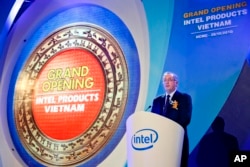Vietnam’s largest technology company may profit from a free trade deal agreed to at the Asia-Pacific Economic Cooperation, or APEC, meetings in Da Nang this month.
The new agreement replaces the Trans-Pacific Partnership, from which the United States withdrew in January.
Eleven countries meeting at APEC agreed to the new deal.
“On the basis of the results of four rounds of negotiations, Ministers…have agreed on some important contents, including an agreement of a new name for TPP with 11 members, the Comprehensive Progressive Agreement for Trans-Pacific Partnership (CPTPP),” said Tran Tuan Anh, Vietnam’s Trade Minister on Saturday.
The redesigned deal came after President Donald Trump took the United States, the world’s largest market, out of the TPP. Trump said he preferred bilateral agreements to large treaties.
Truong Gia Binh, chairman of Vietnam’s largest technology company FPT, spoke to VOA about protectionism as a barrier to free trade. He said he believes the U.S. will return to trade talks.
“I strongly believe at a certain point the U.S. will come back to discuss strong commitment to growth. And I think that’s going to be the way America goes as the leader in the world,” Binh said.
Vietnam hopes to be one of the biggest beneficiaries of free trade as it expands in the Pacific. Vietnam has rapidly growing exports, including technology.
FPT is growing its operations at home. It opened a large new building in Da Nang in April. Speaking at the new building, Binh discussed his belief in free trade.
“I think that’s very important for Vietnam, not only open to the world, but also to improve the regulations for trading and manufacturing and make Vietnam more international,” he said.
Technology is growing fast in Vietnam.
“For domestic, we normally got 15 percent annually. For export, we normally get 25 percent per year,” said Binh.
“Intel and Samsung are among the biggest investors in the country,” he added.
In 2010, Intel opened a $1 billion chip factory in Vietnam. Samsung makes half of its mobile phones in the country. By some estimates, they account for 20 percent of Vietnam’s exports.
Free trade and investment are driving Vietnam’s economy. It has one of the strongest growth rates in Asia, at more than 6 percent a year.
Vietnam has trade deals with a number of other countries, including South Korea and Japan. Binh said His company's largest operation is in Japan. He said the country is a big market where the company sees continued growth.
A trans-Pacific deal, even without the United States, would also help the economy since Vietnam would trade more with its neighbors.
FPT says it will not miss the worldwide, digital revolution.
“Vietnam was late for the last three industrial revolutions,” said Binh. He said this may be the last chance for the country to catch up with the rest of the world.
I'm Susan Shand
Daniel Schearf wrote this report for VOANews. Susan Shand adapted it for Learning English. Caty Weaver was the editor.
Write to us in the Comments Section or on our Facebook page.
_______________________________________________________________
Words in This Story
bilateral - adj. involving two groups or countries
beneficial - adj. producing good or helpful results or effects: producing benefits
regulation - n. an official rule or law that says how something should be done







